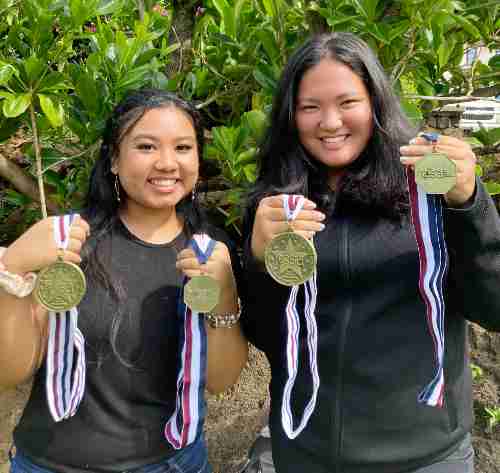If you want to win, you’ve got to work for it.
Chaminade women’s volleyball embraced that mantra this year — and it paid off.

The team wrapped up a wildly successful season after grabbing its first AVCA Division II Coaches Poll ranking since 2005, clinching its first PacWest title in a quarter century and going all the way to the NCAA Region West Division II tournament to end the year with a 27-6 record.
“We didn’t want another season of a talented team falling short of goals,” said Head Coach Kahala Kabalis Hoke. “We knew that this year, we had to think differently if we wanted a different result. So the thought was that we will work for what we want. We will not expect anything to be given to us.”
Hoke said the team “embodied this culture” from day one.
Their motto: Huli ka lima i lalo or “turn the hand down.”
The saying encourages hard work (working the soil with hands down) to cultivate success, Kabalis Hoke said, over expecting things to be given to you (holding hands up to others). “The thought was we didn’t want to have our hands facing up, asking for anything to be given to us,” Kabalis Hoke said.
“We wanted to turn our hands down and work the aina.”
“I knew this team was different,” Kabalis Hoke added. “They were hungry to put in the work they needed to achieve success. They were committed to the process. They understood that there were sacrifices needed and our team leaders set a great example of work ethic and training with intention.”
The team started the season on solid footing and were picked second in the PacWest poll.
In mid-September, the Silverswords debuted at no. 21 in the AVCA Division II Coaches Poll. It was an incredibly strong showing for the team, which had previously been unranked for nearly 16 years. The Silverswords would then go on to beat the No. 11-ranked Metropolitan State University of Denver.
The season’s wins would only continue, including with their first-ever sweep of Azusa Pacific.

And then in November, a win 25 years in the making: the team captured their first Pacific West Conference title since 1996 and snagged a berth in the NCAA West Region tournament. While their subsequent fall to Central Washington was a bittersweet end to their eight-match winning streak and magical season, Kabalis Hoke is still immensely proud — and rightly so — of all her team achieved.
“This season was filled with highs and lows, from season-ending injuries to navigating COVID. We understand how blessed we are to achieve this result and we know it did not come easy and without a cost,” she said, noting the team clinched the highest regional seed (at no. 3) in Chaminade history.
Kabalis Hoke, who received her bachelor’s and master’s degrees from Chaminade, is in her 10th year as the team’s head coach. While an undergraduate at Chaminade, Kabalis Hoke was an All-PacWest First Team selection in 2003 and 2004 and ranked as a PacWest leader in kills, digs and service aces.
Kabalis Hoke said it’s been exciting to see women’s volleyball and athletics at Chaminade grow over the last decade, including with big investments in facilities and the student-athlete experience. “We have really been able to break new competitive ground as a program while unlocking new recruiting potential,” she said. “With each year of hard work and dedication these athletes and coaches put into the program, we level up. Every person who has stepped into our program either on or off the court has made a significant difference and helped us to represent Chaminade in the best way possible.”
In addition to all the wins this season, Kabalis Hoke and her team are celebrating plenty of recognition:
- In early October, middle blocker Lataisia Saulala was named a PacWest Player of the Week following her standout performance against Dominican University and Holy Names University.
- Saulala also clinched the PacWest Defender of the Week title the following month.
- In post-season, Brooklen Pea was named PacWest Player of the Year.
- Setter Alexia Byrnes earned the PacWest Setter and Newcomer of the Year awards.
- Pea, Byrnes and Anna Dalla Vecchia were named to the All-PacWest First Team.
- The All-PacWest Second Team included Greta Corti, Kyra McCain, and Saulala.
- Additionally, Pea and Byrnes were named to All West Region first teams.
Kabalis Hoke also ended the season with high honors. She was named both the PacWest and AVCA Division II West Region Coach of the Year. She said all the praise is appreciated, but she — and her team — are already looking ahead to next year and what they hope is an even stronger season.
“Knowing that we will have the bulk of this team return with a fire lit makes for an exciting thought for 2022,” Kabalis Hoke said. “Huli ka lima i lalo is what we did for the conference championship and now that we’ve raised the bar, we will huli ka lima i lalo for a regional and national championship.”











